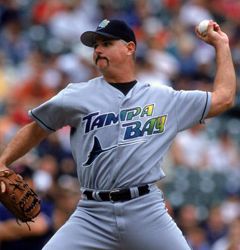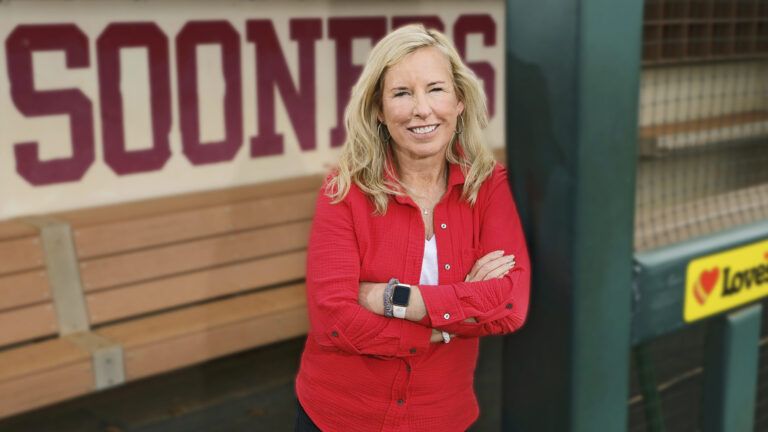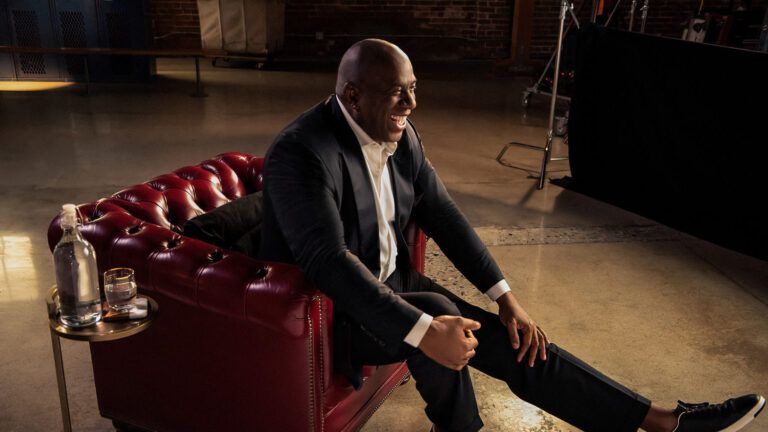Has there ever been something that you were sure you were meant to do? I wanted to be a pitcher. From the time I was four years old I used to lie in bed at night and dream about playing baseball in the big leagues.
After years of sandlot games, Little League, high school and college ball, I got my shot in 1983 when the Milwaukee Brewers organization picked me in the first round of the draft.
But after a year of pitching in their minor-league system I developed a pain in my throwing arm. I had elbow-reconstruction surgery. I spent all of the 1986 season warming the bench. The next year I threw in just four games, and had to have surgery on my shoulder, which also sidelined me in 1988.
Then, during spring training in 1989, I was tossing a few balls to loosen up when I felt something give in my shoulder. I’d popped a ligament. I was only 25 years old and my career was over. I never even made it to the Show—what ballplayers call the majors.
I went back home to Texas, where my wife, Lorri, and I talked a lot about what I’d do next. We decided that if I couldn’t pitch, I’d finish college and get certified to become a schoolteacher. I had another surgery, to remove a three-inch bone spur from my shoulder. For the first time in years my left arm was pain-free, and I realized, Maybe I can’t play at the level I used to, but I can still be part of the game. So I started coaching here and there, and even got back on the mound to toss batting practice.
That’s how I ended up at Reagan County High School, teaching science—and coaching the baseball team. I had my work cut out for me. The Reagan County Owls had only three wins in each of the previous three years. Still, where some coaches might’ve seen the Bad News Bears, I saw a potential all-star team. The guys just needed to work harder, and hear some encouragement.
Whenever the team lost, it was tough for them to bounce back. But one of the reasons I became a coach was to help kids overcome tests like that. My own baseball days had taught me plenty about facing challenges.
One day in April of 1998 I’d put the team through a tough workout, then sat them down on the outfield grass to have a talk. “Believe me, guys, I know how hard it is,” I said as I looked at their sweaty, tired faces. “But you can’t let up just because of that. You need to set goals and stick to them.” A few boys nodded, and I continued. “It’s fine to dream, even better to dream big. You’ve got to work and pray hard to achieve as much as you can, while you can.”
One of my pitchers piped up. “What about you, Coach? What about your dreams?” he asked. “Don’t you still want to play in the big leagues?”
I chuckled. “I gave that dream up a long time ago,” I told them. “I got married, became a teacher, had kids. Now I’m here coaching you. And I don’t regret any of it. I’m right where the Lord wants me.”
My team wasn’t convinced. “We know how much you love playing ball, Coach,” one of the kids said.
“As hard as you throw, you should be in the majors,” another joked.
There was some laughter, so I teased back, “You just don’t like taking batting practice out in the hot sun.”
My talk had gone over better than I’d expected. The guys wouldn’t let up. They wanted to see me chase a dream, even if it was one I’d put behind me. I loved being a teacher and a coach. Finally we made a deal. “Okay, okay,” I relented, “if you guys get to the playoffs this year, I’ll try out for a major-league team. But you’ve got to understand—my playing days are over.”
I was sure I wouldn’t have to make good on my promise, since not one baseball team in the history of Reagan High had ever made it to the playoffs. I don’t know if it was my pep talks, but the team pulled together. By the time I heard the Tampa Bay Devil Rays were holding open tryouts nearby, my high schoolers were headed to the playoffs. “Coach,” they all said, “what about you?” I had to follow through on my end of our deal.
That June Saturday the sun was blazing down on the diamond at Howard Payne University in Brownwood, Tex. At the sign-up table, I saw Doug Gassaway, the same scout who’d discovered me 17 years earlier. “Are you bringing some of your kids for a tryout?” he asked. I told him I was there for myself, and explained about the promise I’d made my team. Doug laughed, but he was nice enough to put me on the schedule. Last, as a courtesy, in case I embarrassed myself.
There must’ve been about 50 or 60 teenagers milling around with their mitts and cleats. Look at these guys, I thought. What am I doing here? I’m 35 years old, for Pete’s sake! Even if I’d made it to the majors way back when, I’d be retired by now.
Finally, my turn came. “Come on, Jim, hurry,” Doug said, eager to get home. He’d seen some good players, but no one especially promising. Lord, don’t let me make a fool of myself, I prayed. Just let me get out of here with my dignity intact, so the kids know I tried.
I wound up and hurled one to the catcher. At least I got it across the plate. I pitched a second, then a third, and it didn’t feel much different than throwing batting practice for the Owls. My arm felt great. After a while, dozens of guys were crowded behind the backstop looking at the radar gun. What’s up with that? I wondered. Either I’m doing really well or just plain terrible.
When I was done, one of the kids who’d tried out came up to me. “Do you know you were throwing ninety-eight miles an hour?” he asked, wide-eyed.
“No way!” I said. In the minors my fastest pitch was barely 88 mph.
“Way!” the kid said. “They even checked with a second radar gun.”
Then Doug came over, smiling. “If only you were ten years younger.”
“Don’t I wish!” I said.
“I’m bumfuzzled, Jim,” he said. “Realistically, I don’t know what I can do. But I’ll try. I’ll call you.”
There was a message waiting for me when I got home. Doug wanted me to pitch again in two days, to see if I could throw hard again so soon after tryouts. Monday I met him and I consistently threw the ball at 95 mph. “We’re ready to sign you, Jim,” he told me. “You’ll have to be in Saint Petersburg in two days for workouts.”
Suddenly, I had a lot of thinking to do and not much time to do it. Lorri and I talked to God, then to each other. “Could this really be where God is leading?” I asked her as we sat at our kitchen table. “I thought I was right where he wanted me.”
“I don’t know, Jimmy,” she said. “Maybe he brought this dream back again for a reason.”
My long-buried visions of playing in the big leagues came back to life. I felt like a boy again. But I hadn’t made it in baseball the first time. Now I had a great family, a rewarding career, and strong ties in San Angelo. Did I want to risk it all on a dream?
“I have that job lined up to teach at a new school in the fall,” I reminded Lorri. “Maybe that’s where I belong.”
“I know this isn’t what we planned,” she said, “but you do have the summer off. If there were ever a good time to turn our lives upside down, this would probably be it.” We both laughed.
“There’s a lot of unanswered questions, Lorri,” I said. “I don’t know where I’ll end up playing, how long we might be apart, or if I’ll be able to support our family on what they pay in the minors. Plus, you’d be on your own with the kids while I’m gone.”
“I can cover home plate,” she said. “For the rest, we’ll have to ask God.”
Two days later, with my wife’s blessing, I was in St. Petersburg, getting into shape. I didn’t know what to expect, but it turned out I threw harder and faster than I had when I was 19. After two weeks I was sent to a Double A club in Orlando, then moved up to Triple A in Durham, pitching for the Devil Rays’ top farm team. I was as surprised as anybody, but tried not to get my hopes up.
In September, the minor-league season ended, and between the two teams, I finished with a record of 3 and 2, with one save and 22 strikeouts in 28 innings.
I gave it my best, and it was quite a ride, I thought as I packed up to drive home to Texas. But that same day I got called up to the Show. I was astounded.
On Saturday, September 18, I was put on the Tampa Bay roster. I became the oldest major-league rookie in nearly three decades. We played the Texas Rangers that day. Their stadium in Arlington is just a few hours’ drive from my home, so I got to see Lorri and the kids for the first time in three months.
In the bottom of the eighth with two outs, I was sent in to relieve. I don’t think I took a breath from the time I left the bullpen, but I managed to strike out Royce Clayton on four pitches.
A million thoughts raced through my head that night. But I kept coming back to one thing: that talk I’d given the Owls after a hard day’s practice. “It’s fine to dream,” I’d told them, “even better to dream big.”
I’d figured my words might be inspiration enough. Who could’ve guessed I would also show them by example? That’s what can happen when you dream big and trust God with those dreams—even if they take a little longer than you expect to come true.






